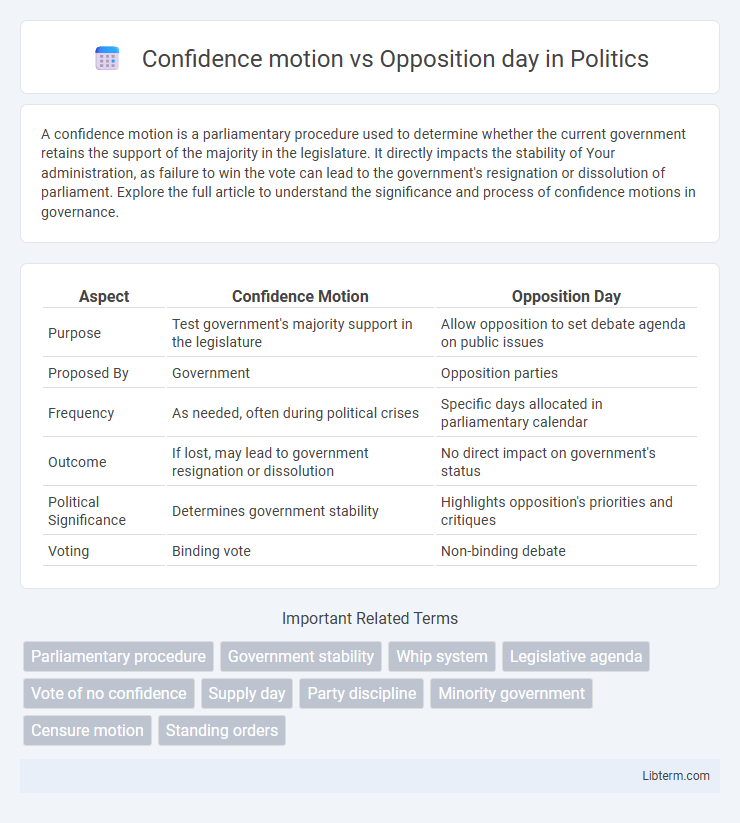A confidence motion is a parliamentary procedure used to determine whether the current government retains the support of the majority in the legislature. It directly impacts the stability of Your administration, as failure to win the vote can lead to the government's resignation or dissolution of parliament. Explore the full article to understand the significance and process of confidence motions in governance.
Table of Comparison
| Aspect | Confidence Motion | Opposition Day |
|---|---|---|
| Purpose | Test government's majority support in the legislature | Allow opposition to set debate agenda on public issues |
| Proposed By | Government | Opposition parties |
| Frequency | As needed, often during political crises | Specific days allocated in parliamentary calendar |
| Outcome | If lost, may lead to government resignation or dissolution | No direct impact on government's status |
| Political Significance | Determines government stability | Highlights opposition's priorities and critiques |
| Voting | Binding vote | Non-binding debate |
Understanding Confidence Motions: Definition and Purpose
A confidence motion is a formal vote in a legislative assembly to determine whether the sitting government retains the support of the majority of members, essential for its legitimacy and continued governance. It serves to affirm or challenge the government's mandate, often triggered by significant political events or policy disputes. Unlike Opposition Day debates, which allow opposition parties to set the agenda and highlight issues, a confidence motion directly tests the government's authority and can lead to its resignation or dissolution if lost.
What is an Opposition Day? Key Features Explained
Opposition Day is a designated day in parliamentary procedure when opposition parties set the agenda to discuss issues they prioritize, enabling them to challenge the government's policies directly. Key features include a limited number of such days allocated annually, facilitating debates on government accountability without the ruling party's control over topics. Unlike a Confidence Motion, which tests the government's majority and can trigger general elections if lost, Opposition Days focus on spotlighting specific concerns rather than determining the government's survival.
Historical Context: Confidence Motions in Parliamentary Systems
Confidence motions in parliamentary systems serve as a critical test of government stability, historically determining whether a ruling party or coalition maintains the legislature's support to govern effectively. Originating in the Westminster model, these motions have been pivotal in moments when governments faced crises, such as the 1979 vote of no confidence that led to the UK's general election and the fall of James Callaghan's Labour government. Opposition day, contrastingly, provides scheduled opportunities for opposition parties to set the parliamentary agenda and challenge the government without necessarily threatening its existence.
The Role of Opposition Days in Legislative Agendas
Opposition Days play a crucial role in shaping legislative agendas by allowing opposition parties to set the parliamentary agenda and highlight key issues distinct from government priorities. Unlike Confidence Motions, which test the government's majority and stability, Opposition Days provide strategic opportunities to challenge policies, influence public debate, and press for legislative changes without directly threatening the government's survival. This mechanism ensures a more balanced parliamentary scrutiny, enabling minority voices to impact legislative discussions and hold the government accountable.
Key Differences: Confidence Motion vs Opposition Day
A Confidence Motion tests the government's majority support in the legislature and, if lost, can trigger its resignation or dissolution of parliament. An Opposition Day, allocated to opposition parties, allows them to set the parliamentary agenda to debate issues not scheduled by the government but does not compel the government to resign if their motions fail. Confidence Motions directly impact the survival of the government, whereas Opposition Days are primarily tools for raising alternative policies and scrutinizing the government without threatening its tenure.
Political Implications of Confidence Motions
Confidence motions test the government's legitimacy, directly impacting its stability and ability to govern effectively in parliamentary systems. A successful confidence motion reinforces the ruling party's authority, often leading to policy continuity and strengthened political mandates. Conversely, failure in a confidence motion can trigger government resignations, dissolutions of parliament, or early elections, reshaping the political landscape.
How Opposition Days Shape Government Policy
Opposition Days provide a structured opportunity for minority parties to influence government policy by proposing debates on specific issues, allowing them to highlight alternatives and exert political pressure. Unlike Confidence Motions, which test government stability, Opposition Days directly shape the legislative agenda through focused scrutiny and public discourse. This process often compels the ruling party to adjust policies to address criticisms and reflect broader parliamentary sentiments.
Notable Examples: Confidence Motions and Opposition Days in Action
Confidence motions, such as the 1979 UK vote leading to the fall of the Labour government, demonstrate their critical role in affirming or challenging a government's authority. Opposition days, exemplified by the UK's tradition of allocating 20 days annually for the opposition to set the agenda, provide a strategic platform for scrutinizing government policies and proposing alternatives. These mechanisms distinctly influence parliamentary dynamics by enabling direct government accountability and fostering robust debate.
Impact on Government Stability and Accountability
Confidence motions directly test the government's majority support in the legislature, determining its ability to govern and potentially leading to its fall if lost. Opposition days provide a platform for opposition parties to highlight government weaknesses and challenge policy decisions, promoting accountability without immediately threatening governmental stability. Together, these parliamentary tools balance scrutinizing the executive while maintaining the structural integrity of the political system.
Lessons Learned: Best Practices for Parliamentary Procedures
Confidence motions and Opposition days serve distinct roles in parliamentary procedures, with confidence motions testing the government's stability and Opposition days allowing scrutiny through scheduled debates. Best practices highlight the importance of clear procedural rules, timely communication, and strategic agenda-setting to ensure productive debates and avoid government deadlocks. Effective parliamentary management requires balancing accountability with legislative efficiency, fostering transparency, and respecting minority rights within the legislative process.
Confidence motion Infographic

 libterm.com
libterm.com